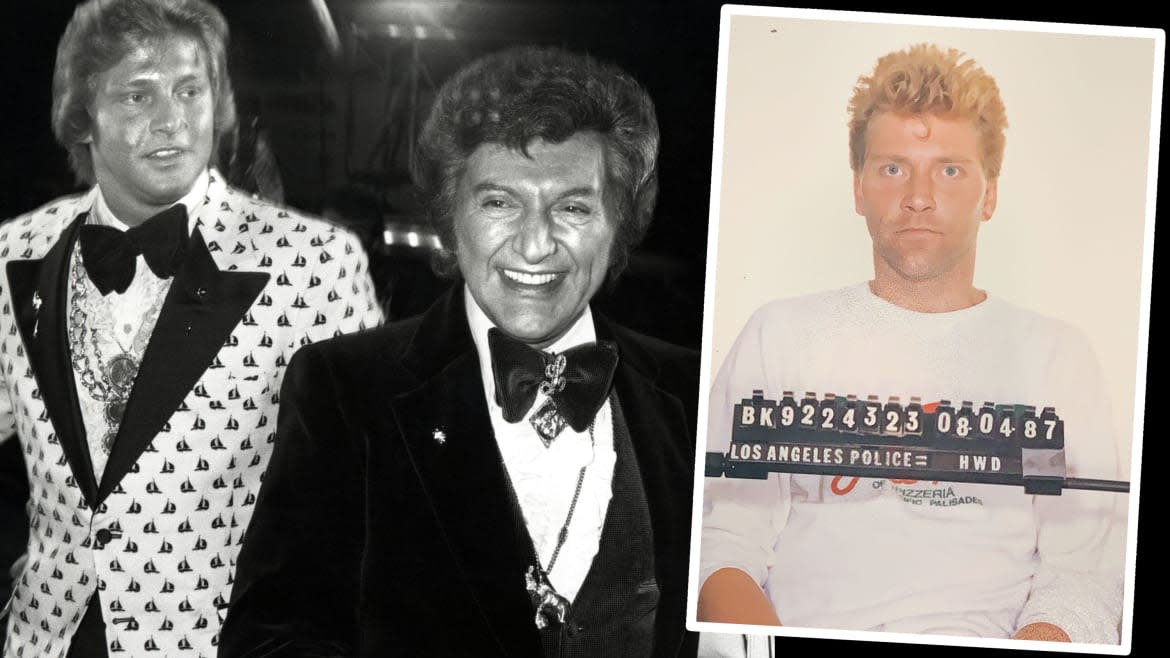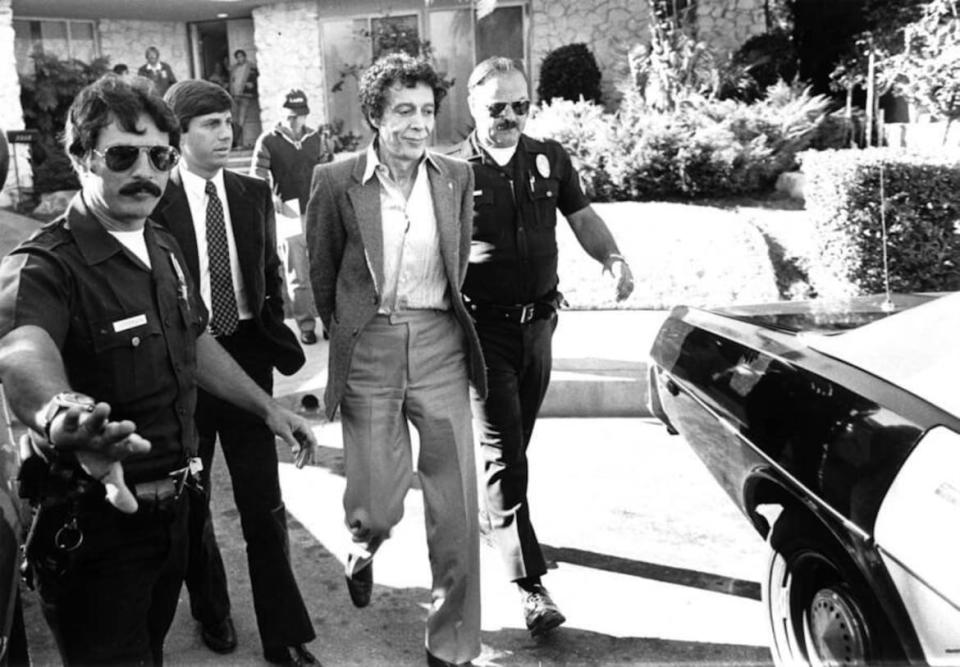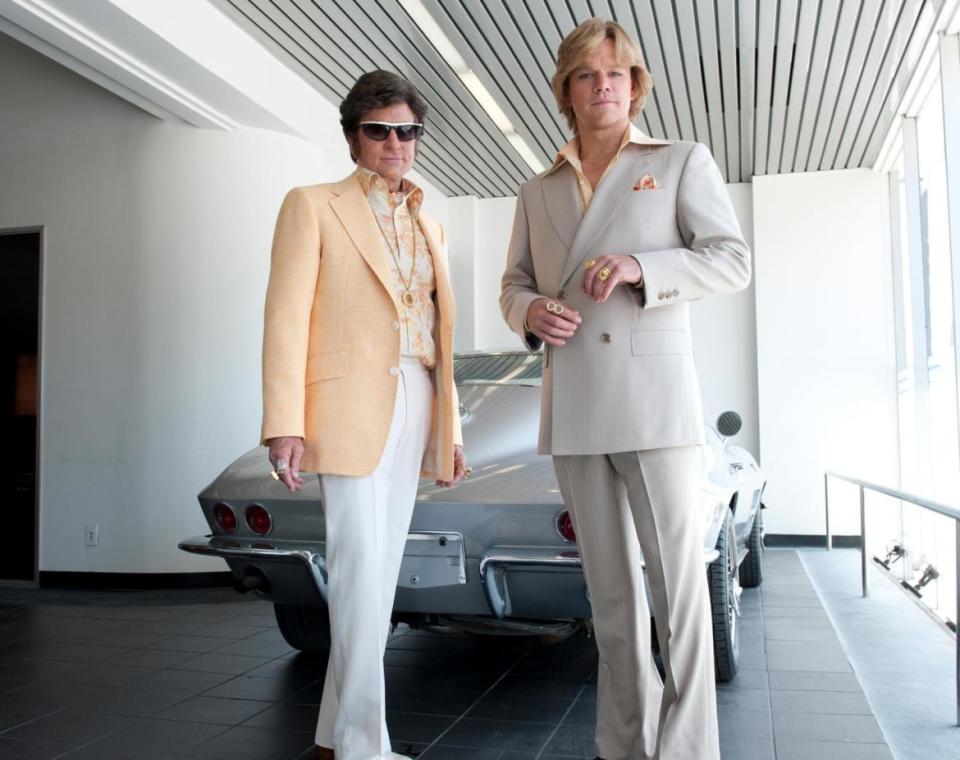A Prison Interview With Scott Thorson, Wonderland Murders Witness and Liberace’s Pet

- Oops!Something went wrong.Please try again later.
- Oops!Something went wrong.Please try again later.
After 10 years in the LAPD’s Robbery-Homicide Division, Detective Bob Souza thought he’d seen it all. But nothing could prepare him for the horrors he’d encounter at 8763 Wonderland Avenue.
“There was more blood in that scene than I’d ever seen,” he says, describing it as even gorier than the Tate-LaBianca murders. “It was such an overkill that we knew there was something a lot more to it than just a dope rip-off. They had pissed somebody off. This just smacked of revenge.”
When Detectives Bob Souza and Tom Lange entered the home, nestled in the hip L.A. enclave of Laurel Canyon, they found pills and pipes scattered all over the floor—along with four dead bodies whose heads were bashed in, presumably by hammers or metal pipes. There was a lone survivor: Susan Launius, the wife of one of the targets, who’d been beaten to within an inch of her life. Since all the victims were members or associates of the Wonderland Gang, a notorious group of drug dealers that included at least one prominent neo-Nazi, it came to be known as the Wonderland murders, and inspired the films Boogie Nights and Wonderland.
To this day, the murders remain unsolved.
‘Karen’ Director Defends His Controversial Movie: ‘It’s a Feel-Good Film’
“Los Angeles has this reputation for bizarre and bloody crimes,” offers Michael Connelly. “Joni Mitchell, Crosby, Stills and Nash, and the music of a generation is associated with Laurel Canyon, and this is the dark blot on that reputation. You can make the argument that the excesses that led to all this great cultural change and music ultimately led to this violence, because the throughline is drugs.”
Connelly, the crime novelist and co-creator of Amazon’s Bosch, is the host of The Wonderland Murders & the Secret History of Hollywood, a new podcast out on Audible July 1, which also marks the 40th anniversary of the murders. Over eight episodes, the pod re-examines the Wonderland murders—a serpentine saga comprising Hollywood’s top nightclub owner and drug supplier, a tainted jury, corrupt cops, and a legendary porn actor.
At the center of it all is Scott Thorson.
If that name rings a bell, it should. For years, Thorson served as Liberace’s pet, and documented the flamboyant entertainer’s cycle of abuse in the bestselling book Behind the Candelabra: My Life with Liberace. An HBO film adaptation from director Steven Soderbergh, starring Matt Damon as Thorson and Michael Douglas as Liberace, won 11 Emmys. But he’s never spoken publicly about his role in the Wonderland murders until now.
Thorson’s eyewitness testimony serves as the backbone of Connelly’s podcast, and Thorson proves a fascinating storyteller. One of the detectives in the series describes him as “one of the best liars in the world,” though Connelly maintains that Thorson’s retelling of the Wonderland murders has been remarkably consistent.
I managed to reach Thorson at Nevada’s High Desert Prison, where the 62-year-old is currently locked up for violating the terms of his parole.
How did you land back behind bars?
I was released 15 months ago and doing excellent, and then my health started failing me. When I was shot years ago five times, three of the bullets went through my abdomen and were lodged in my spine, so I had nerve damage in my left leg. Then, in 2012, I had colon cancer and the chemo and radiation killed off the nerve endings in my leg, so I have chronic pain syndrome now. I was in and out of hospitals, got into a car accident, and missed a court date, and the judge just felt that I could no longer do the [rehab] program. I’ll be paroled August 12. I think it’s really shitty to do something like that to someone who worked so hard. I’ve been sober now for nine years. It was very discriminatory, I think, on [the judge’s] part.
Thorson was arrested in 2013 for drugs, burglary, and using a credit card without consent. A pair of failed drug tests in 2013 landed him in prison for violating parole. The judge threw Thorson back in the slammer for communicating with a felon.

Scott Thorson is seen in a police booking photo after his arrest for violating the terms of his probation when he failed a drug test on September 5, 2013, in Reno, Nevada.
Why did you decide that now is the time to open up about witnessing the planning—and aftermath—of the Wonderland murders?
I was just in the wrong place at the wrong time when the Wonderland killings happened. I go into detail that I’ve never spoken about. It was a very sensitive subject, but now that Eddie Nash is dead, I really don’t care. I was involved in quite a bit of it. Me and Liberace did not know what we were getting into, and I was even introduced to Eddie Nash through Liberace and his friend, Chris Cox. We decided to go into the club business with Eddie. You know, during the ’70s and ’80s, it was all sex, drugs, and rock ’n’ roll. But we didn’t realize at the time how dangerous Eddie Nash was. He was the drug lord of Los Angeles.
Eddie Nash, a Palestinian immigrant born Adel Gharib Nasrallah, owned a number of Los Angeles nightclubs in the ’70s that were frequented by celebrities, including Starwood, Seven Seas, Ali Baba’s, The Odyssey, Paradise Ballroom, and The Kit Kat strip club. He also controlled much of the cocaine and heroin distribution in L.A. Thorson and Liberace were investors in some of Nash’s clubs, and Thorson, a drug addict, would acquire large quantities of cocaine from Nash.
Can you tell me what you witnessed on July 1, 1981?
That night, I got there prior to Gregory Diles bringing [John] Holmes back to the house. I flew in from Tahoe and was there to pick up the club’s earnings. That’s when I had a bad cocaine addiction and was supposed to pick up a large amount of coke, and that’s when Eddie told me that someone stuck a gun down his throat, and he was robbed of over a million dollars. Then, I see Gregory Diles dragging in John Holmes by the scruff of his neck. Eddie says to me, “Excuse me, Scott—go in the living room, I’ll be right with you.” And that’s when they started beating the shit out of John Holmes and torturing him, because they found out that he was the one responsible for setting up the robbery with the Wonderland gang. And that’s when they forced John to take them up to Wonderland. I wasn’t there during all that.
Holmes, the world’s most famous male porn star, had a crippling addiction to cocaine and thus owed a great deal of money to the Wonderland Gang, led by Ron Launius. So, he helped Launius and his crew plan the armed robbery of Eddie Nash, and left a sliding door open to Nash’s home so the robbers could enter. When Nash found out about this, he forced Holmes to take his crew to the Wonderland Gang’s house. Police found Holmes’ handprint above a bed at the crime scene.
And you were there when Nash, Gregory Diles and co. plotted the Wonderland murders—but also when they returned to Nash’s home covered in blood.
I was there—and I was there when they brought him back, and when Gregory Diles came in the house with the murder weapon. There were certain things that the police department never told the public at the time, like that the victims were beaten so hard that there were indentations of the pipe on their foreheads. And I testified in the Eddie Nash case. I even told [deputy district attorney] Dale Davidson that there were some serious mistakes that they made. Eddie got to the one Hispanic juror in there and paid her $50,000, and so the verdict came back not guilty.
Nash would later admit to bribing the juror with $50,000, resulting in an 11-1 hung jury in his trial for planning the Wonderland murders. He’d later plead guilty in 2001 to RICO charges, money laundering, jury tampering, and ordering his crew to retrieve stolen goods from the Wonderland Gang’s home—but not to ordering the murders. He received just four and a half years in prison, and died in 2014. Alfred Molina’s character in Boogie Nights is based on Nash.
Nash was also the drugs supplier to the Hollywood stars.
He was a very powerful man. He supplied a lot of stars [with drugs]. He was supplying Kathy [Smith] with the cocaine and heroin that killed [John] Belushi. He needed me because I knew Richard Pryor, Redd Foxx, and Flip Wilson, who were big customers. We had the best coke in town and we were supplying it to Hollywood. So, that’s what was going on.

Police arrest Nash at his Laurel Canyon home during a drug raid on Nov. 25, 1981. Police found at least two pounds of cocaine.
John Holmes seems to be the one responsible for all this mayhem. And you mention on the podcast that you witnessed John Holmes return to Nash’s home covered in blood.
Diles made him participates, and Holmes is the one that got them through the door. Diles marched through and beat everybody in the house—thinking that they were all in the house—but there was only one man in there, and they ended up beating all the women in there. I was scared to death. I had no idea what I was getting involved in, and later on, it was all over the news and Liberace was freaking out, going, “Oh no! What did we get into?” That’s when me and Liberace had our split.
Chris Cox told Liberace that you were at Nash’s house, right?
Chris Cox is the one who broke it to Liberace. Chris Cox came up to Vegas and wanted to hide out in the house for a while because he was scared. But it was all over the news. I had my parting with Liberace, and then Nash framed me, basically, to run his drug empire. And then he went to prison, and I was running things for him for the longest time. It’s just an amazing story. I survived.
You really are a survivor.
Michael Connelly said, “You’re the most fascinating person I’ve ever interviewed, because they’re all dead and you’re the only survivor.” I guess it just wasn’t my time.

Michael Douglas as Liberace and Matt Damon as Scott Thorson in Behind the Candelabra
Looking back on it, do you feel like you were preyed on by Liberace?
Absolutely. Absolutely. You’ve gotta remember something: here’s a 17-year-old kid that came from Wisconsin, in and out of foster homes, dirt poor, and all of a sudden I’m taken into the arms of Liberace—all that fame, all that money, and he’s the first person that ever paid attention to me. He wanted to change my name, to change my features to resemble him. He wanted to adopt me as his son. He just preyed on young boys, you know? He had a dark side about him.
You mentioned him forcing you to get cosmetic surgery to look like him, which then I understand got you addicted to drugs as you recovered from the surgeries. It’s all very fucked up.
It’s pretty fucked up. Once he wanted my face changed, he wanted me thinner. He had the doctor prescribe me pharmaceutical cocaine, Quaaludes, and Demerol, and got me hooked. I was never a drug addict before that. He started all this, and then, as he would say, “I created a monster” and then he wanted to throw me out on the street. I think my second book that I’m working on now is going to be fantastic. There’s enough drama in it where Matt Damon would jump on it, because you’ve got the Mafia, the Laurel Canyon murders, how I became an evangelist, and how this kid survived all that. This will be after Liberace dies, and I’m very excited.
Do you feel you were fairly compensated for the Behind the Candelabra film?
No. Jerry Weintraub ripped me off, because I had points in that film that I never received. I don’t know exactly how much money [it made], because we were never able to get the records, but I don’t think I was fairly treated by Jerry Weintraub at all. I’ll say that but I don’t want to be negative and talk bad about him.
You mentioned how you were shot five times at a hotel room in Jacksonville after being placed in federal witness protection. But the gunman was never found. Do you have any idea who did that?
No, I don’t. If it was done by some of Eddie’s associates… I have a pretty good idea of who, but I don’t want to say. I want to keep something for the book!
Got a tip? Send it to The Daily Beast here
Get our top stories in your inbox every day. Sign up now!
Daily Beast Membership: Beast Inside goes deeper on the stories that matter to you. Learn more.

